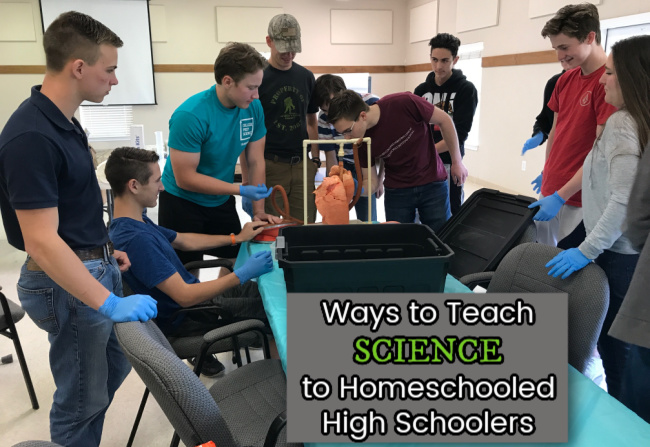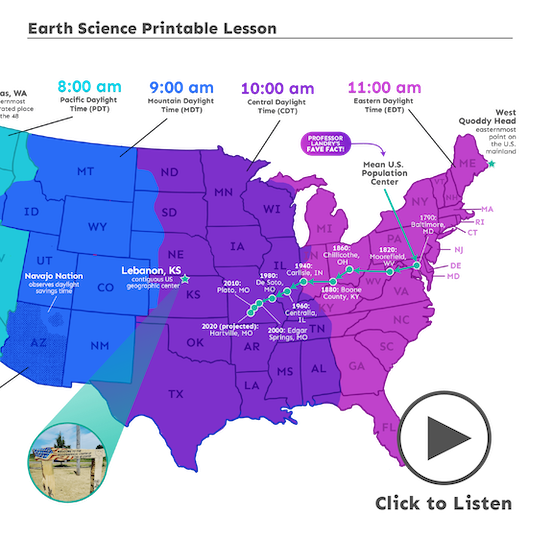The following is a sponsored post in collaboration with College Prep Science. All thoughts and opinions are my own.
Science. It's probably the second most feared subject for homeschool parents to teach. (The first, I suspect, is math!)
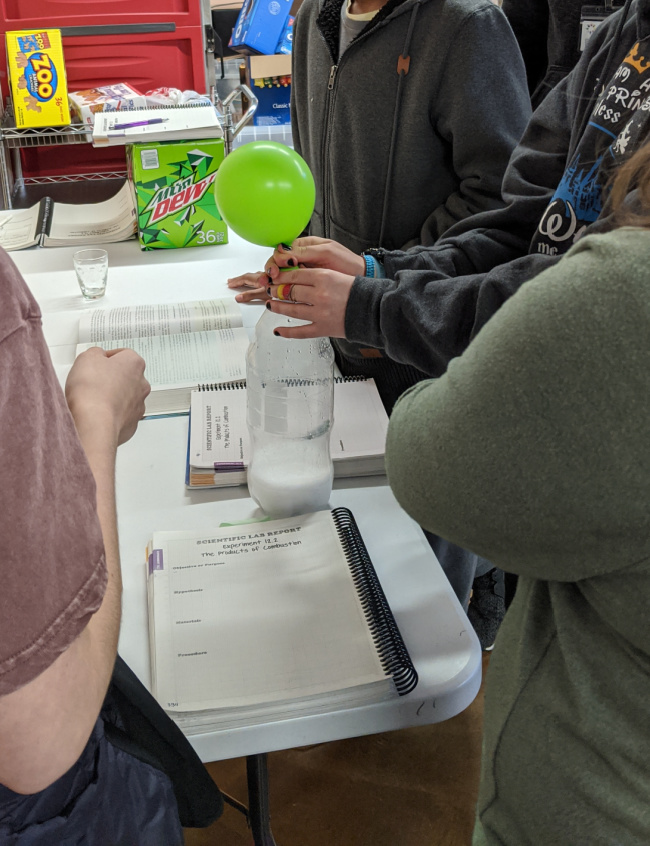
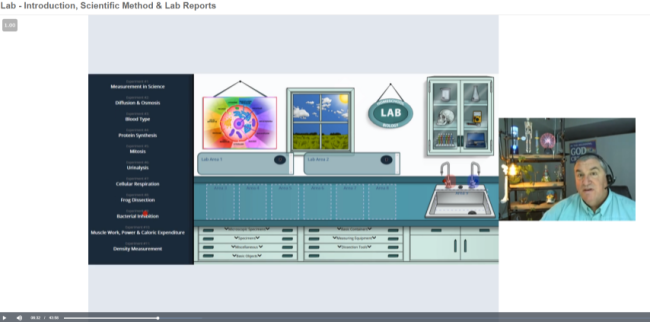
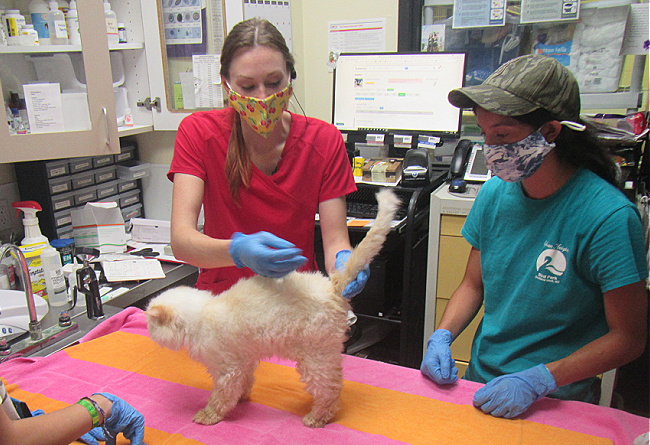
Over and over, I've talked with or heard from parents who have been scared to teach their homeschoolers science. ESPECIALLY in high school. Sometimes it is because they themselves didn't do very well in the subject when they were young. Other times it is simply because they are intimidated by the more complex topics that are covered in high school science courses. Or maybe they cringe at what they think will be the expense involved to purchase all the equipment needed for labs and science experiments.
Whatever the reason, I want to share five phenomenal resources that are available for homeschoolers, specifically those with high school students.

Co-ops
PROS:
One of the reasons many homeschoolers join homeschool co-ops is to share the workload and have their child take classes from another knowledgeable parent. Those parents who are overwhelmed with the idea of teaching math, British lit, or science can turn that responsibility over to someone who is more comfortable doing so.
The fabulous part of co-ops is that most of them look at the strengths and interests of participating parents and try to match parents with subjects they are most likely to enjoy teaching. Prior to Covid, we were in a homeschool co-op in which I taught middle school General Science. I had so much fun. And I think that maybe the kids enjoyed it a little more because I liked it (at least I hope they did!).
The other benefit is that our kids get to learn in a class setting with other kids. If your child is a social butterfly or simply enjoys (or needs) learning in a group setting, but in a small class size, this is a great option.
The other bonus to this method is that I was able to incorporate the cost of materials needed for labs into the cost of the class so that it was covered. PLUS I didn't have to find a place at home to conduct the experiments and I had extra helpers to clean up afterward! Ummm... that was a total win-win in my book.
There are many other cons to joining a co-op, but the focus of this post is science for high schoolers, so I'll end here.
CONS:
The one downside to joining a co-op may be the cost. Many co-ops have set fees: registration fees and class fees, the latter of which may vary greatly. And some may require that your student take at least 3 or 4 classes total. If you're on a budget, this might not work out for you.
If they don't incorporate the materials cost in the price of the class, they may send home a materials list of items that you need to purchase and contribute. You may also have to conduct certain experiments at home.
Also, co-ops aren't available in every town or city. You might not have access to one, or more than one to choose from.
Self-Paced Online Classes
PROS:
There are more and more online classes becoming available. Our favorites are the self-paced (recorded) ones. These allow us so much more freedom because our schedule is crazy. If we have a doctor's appointment in the morning, or family arriving for a visit, or any other important event, my son can still fit in his lessons another time or whenever is convenient for him.
The videos can be paused, rewound, and rewatched. So if there's something your child needs to review more than once, it's easy to watch it again. Likewise, if they are reviewing material that your child has already mastered, it's easy to skep ahead. There's also no limit to the times you can watch the lesson.
Our favorite self-paced online classes are:
- Khan Academy (free) - Presented in a simple and orderly manner. Kids watch a video and then answer a set of questions before moving on.
- PBS Learning (free) - Lots of videos and lessons are available. But there is a lot of prep work on the parent's side to organize and find the right ones. It's not organized in an orderly A to Z fashion. (Or if it is, I haven't figured it out yet.)
- Study.com (monthly subscription) - Lots of class options here, including AP and CLEP courses. Students watch the video lecture then complete a quiz.
- College Prep Science (priced per class) - This program has their own dashboard. Students receive a PDF download and watch the video, taking notes along the way. You can read my more thorough review of their classes here.
- Thinkwell (priced per class) - Honors classes only.
CONS:
With some of the online classes you can't contact the teacher with questions. Khan Academy does offer links to related articles and videos if you get stuck on a quiz question. But often you can't actually email/message a teacher with self-paced/recorded video lessons. Except for College Prep Science, which allows you to email Mr. Landry from the program's dashboard. (And you can expect a fairly quick response.)
Live Online Classes
PROS:
Live classes make interaction with the teacher much easier. If you have a question, you can often get an answer right then and there.
This may also be the best choice for students who find it important to build relationships with their teachers and/or other students.
Sites that offer live online classes include:
- Outschool (priced per class)
- College Prep Science (priced per course)
- Varsity Tutors (varies)
- Time4Learning (monthly subscription)
- MyFunScience.com (priced per class - payment plan optional)
CONS:
There is often little flexibility in the schedule. If you enjoy working in learning around your schedule, then a live class isn't the best choice. Some live classes offer makeup times, but not all of them do. However, if you know that your child is available at the same day and time each week, it can be a "pro."
You can't "rewind." Live classes can be fast-paced and move quickly through topics. They may expect your student to rely on the notes they take in order to keep up. A few do offer recordings after the live class is over, but not all of them. It's wise to ask about this option before you commit.

Virtual Labs
Virtual labs are fantastic. My son did a biology virtual lab last year and it was excellent. You can read about our experience here. Or you can read a summary of the pros and cons below.
PROS:
There's no mess! This is number one in my book. You don't have to worry about clean up afterward!
It's budget friendly. Virtual labs mean you don't have to spend a lot of money on equipment and materials. Everything is available online!
It saves space. Again, all you need is internet access. So they can be done on a tablet, computer, laptop, or even your phone. No need to set up extra tables to complete the experiments.
There's less risk. You don't need goggles or safety glasses (but you can wear them if you want to!). You don't have to worry about explosions or fumes. It's all online.
CONS:
It's not as hands-on. If your child loves the mess and experience of actually doing hands-on experiments, they may be disappointed with the virtual labs. However, the virtual labs are VERY interactive.

Science Camps & 2-Day Lab Intensives
If you have the time and the budget, week-long science camps or two-day lab intensives can be a huge addition to your child's homeschool education.
PROS:
Your child is immersed in the experience. Camps are set up to expose the students to the technology, techniques, concepts, professionals, environment, and so much more throughout the week.
Some are (science) career oriented. My daughter participated in a veterinary camp through Texas A&M's Sea Camp program last summer. But you can find others in a variety of fields, such as pre-med and marine science.
Students can make lasting friendships. My daughter still stays in touch with one of the other students that participated in the program. It's a great way for them to meet other children from around the country and forge long-distance relationships.
CONS:
They can be expensive. Camps or labs can range from several hundred dollars to a thousand dollars or more and this doesn't usually include travel costs.
Free Resources
I encourage you to visit the resources I've listed in this post to see if any of them are a good fit for your family! This freebie page from College Prep Science is a good place to start.
Want to find this article again? Pin it!

